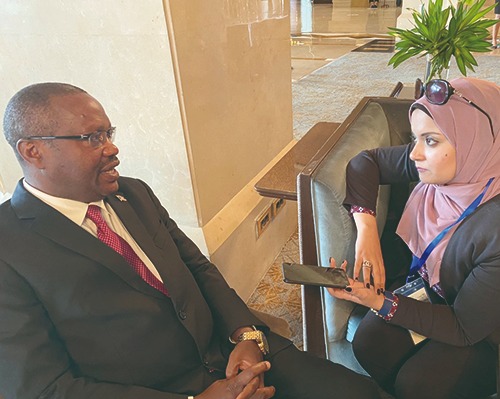Egypt helped fellow African states a lot as they struggled to get rid of colonialism.
In doing this, the Arab country believed that foreign occupying powers were in Africa to steal its wealth.
Egypt was the first Arab and predominantly Muslim nation to establish diplomatic relations with Burundi, after the African state gained independence in 1962. Two years later, specifically on December 8, 1964, Egypt established its embassy in Gitega, the capital of Burundi.
Since then, relations between the two countries have become multifaceted, turning into a model for co-operation in all aspects.
The diversity of relations between Cairo and Gitega is a direct result of numerous and fruitful mutual diplomatic visits by officials from the two countries.
The Egyptian Mail sat with Burundi’s Minister of Environment, Agriculture and Livestock, Rurema Deo-Guide, during his latest visit to Cairo, to discuss different aspects of co-operation between Egypt and Burundi, including in water and in the environment.
Co-operation with Nile Basin countries is a cornerstone of Egypt’s foreign policy. It is actually an essential part of Egypt’s strategy to boost ties with these countries.
Human resources and technical expertise are among the factors standing behind the success of Egypt’s co-operation with Nile Basin states.
Minister Deo-Guide, who participated in the 4th Cairo Water Week in October, discussed with Egyptian Minister of Irrigation and Water Resources, Mohamed Abdel Atti, means of enhancing water co-operation.
“Water is life,” Minister Deo-Guide said. “We cannot talk about the environment or agriculture without discussing water management.”
This was why he discussed important ways to manage water with Minister Abdel Atti.
Both ministers agreed to share experiences and innovative tools to manage and share water across Africa.
Egypt has carried out several water and irrigation projects in co-operation with Burundi.
Burundian students and scholars come to Egypt to obtain diplomas in water management from the College of Engineering in Cairo.
The National Water Research Centre in the Egyptian capital also grants diplomas to African students, including Burundian ones, in the same field.
“We have an agreement with Egypt on water management,” Minister Deo-Guide said.
During his meeting with Minister Abdel Atti, the Burundian minister discussed where co-operation between their two countries stands.
An Egyptian technical team is expected to visit Burundi soon.
Minister Deo-Guide said Burundi has abundant water resources.
This is a matter, he said, that requires integrated management to make the best use of available water resources.
The two countries signed the aforementioned agreement on March 24, 2021. It aims at the implementation of an integrated water resources management project.
The project, Minister Deo-Guide said, includes the provision of technical support on preparing a study on the establishment and maintenance of a network of private rainwater drains in cities and villages in Burundi.
The minister added that the project also includes conducting technical studies on resource management and the development of waterways in Burundi.
Minister Deo-Guide said agreements are extremely important between countries. “These agreements are heavily necessary,” he said.
He added that he believed that the Nile River can unite Nile Basin countries, not pit them against each other.
“One people, one river,” he said. “We have to believe in that to promote peace.”
He noted that Egypt, Sudan and Ethiopia need to sit together to find a way out of the current stalemate on the Grand Ethiopian Renaissance Dam.
“Burundi always promotes dialogue and discussing technical issues,” Minister Deo-Guide said. “Water is important for the dam, but it is also important for people’s life in Egypt.”
He said Burundi is the source of the Nile River and that it has strong belief in the importance of balancing development and peoples’ lives.
Minister Deo-Guide highlighted the importance of investing in environmentally-friendly projects to address climate change.
“Definitely, developed countries have more responsibility to support developing countries,” he said.
He added that it is important for developed nations to support climate finance, in the light of a pledge by these nations to provide $100 billion to help developing countries address climate change.
“We are on the same planet, in the same journey,” Minister Deo-Guide said. “So, we have to be together to reach our destination.”






Discussion about this post